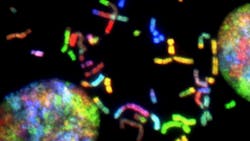Scientists may have discovered a new link that could bring the scientific and medical community closer to understanding why glioblastoma, the most common malignant brain tumor, is deadlier in males than females.
A new study by Florida International University, Stempel College, Cleveland Clinic and the National Cancer Institute, part of the National Institutes of Health, demonstrate a connection between translocator protein 18 kDa (TSPO), a widely used biomarker of neuroinflammation, and survival outcomes in glioblastoma patients.
Findings suggest that a variation in the protein’s structure correlates with worse survival outcomes in males than females.
“This is a fascinating observation because glioblastoma has sex-specific differences,” said Diana Azzam, Assistant Professor at Stempel College of Public Health & Social Work at Florida International University, who was corresponding author of the study. “It's more frequent in males than females, and the survival outcome of males is worse than females. In the future, this can potentially help patients receive personalized treatments for the disease.”
Glioblastoma is found in adults and is 1.6 times more likely to affect males than females. Each year, approximately 12,000 people in the U.S. are diagnosed with glioblastoma. Patients diagnosed with glioblastoma experience symptoms like seizures, persistent headaches, or loss of brain function like memory loss and personality changes. Glioblastomas have devastating consequences for patients. The median survival time is 12 to 14 months, and less than 7% of patients survive more than five years. Thus, better treatments and strategies for improving prognosis are urgently needed as there is no cure for the disease.
Researchers analyzed the blood samples of 441 glioblastoma male and female patients to evaluate the correlation between the TSPO polymorphic variant rs6971, one of the most frequent polymorphisms (variants) found in humans, with the clinical outcomes of glioblastoma patients. Compared with female glioblastoma patients, males with the TSPO variant had shorter overall and progression-free survival times. There was no association between the variant and survival time in females. The study suggests that, as a predictor of poor prognosis, the variant has potential for use as a prognostic biomarker in glioblastoma patients.

